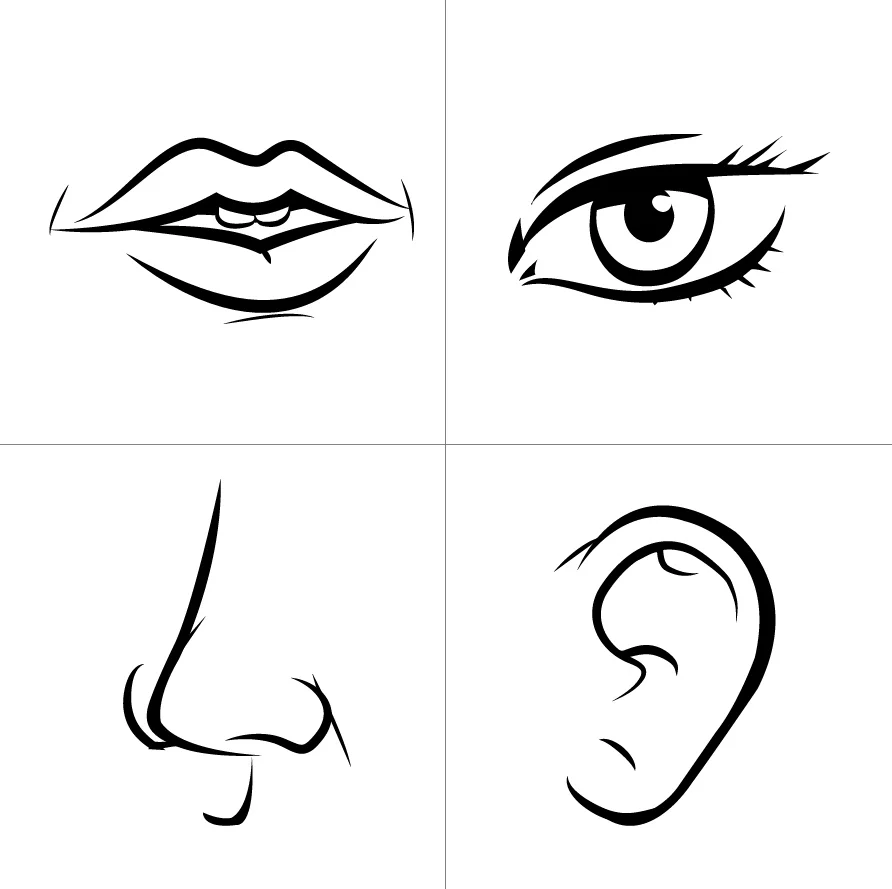Please Like the Blog and Share it for Maximum Reach
Table of Contents
Triggering a Response from the Senses
After Sama, Dama is the second treasure that a sadhaka must aim to acquire. We know that desire manifests in the mind but tries to fructify in the physical plane. A tranquil mind terminates actions for sense pleasure. However, the sense organs due to their encoded functionality, behave in predefined ways. As soon as the senses come in contact with the sense object, it launches an impulse in the mind.
This causes desires to manifest, which very inconspicuously settles in the Chitta as Vasanas and Vrittis. The eyes see, the ears hear, the skin senses touch, the tongue tastes, so on and so forth. We are bound to label things as beautiful, awful, tasty, aromatic, malodorous, etc as the processing between the senses (Jnanendriyas) and the mind (Manas) occurs so seamlessly that there is no conscious thought invested in this process.
Due to the presence of the unconscious element in the process, there is scope for ruffle and upheavals, induced by the sensory inputs. But, for a person who has completely cut the tentacles of the mind that moves externally, the sense organs pose no potential risks as the sensory input does not get fueled by desire.
Unwavering Mind Yields Perfected Senses
The 5 Jnanindriyas (Shotra (स्रोत) — ears, Chakshu (चक्षु) — eyes, Grahna (घ्राण) — nose, Jivha (जीभ) — tongue, Tvak (त्वक) — skin) will continue to give us data.
But, due to complete tranquility, the mind shall not trigger any desire or passion to pursue the sense object. Hence, Karmendriyas automatically get mitigated and shall not volunteer us to pursue anything outwardly.
However, it is indeed rare to find persons with such unwavering grit and who constantly dwell in the chamber of tranquility. It is rare to find people who are not agitated by the sensory input which the Jnanindriyas forward. The process of controlling the sense organs from indulging in sense objects is called Dama.
Controlling the Senses: A Tranquil Mind VS An Agitated Mind
Let us understand how the evolution of the mind urges our senses of action towards the stimuli. Though, both a person of tranquil and mundane disposition receive sensory information, due to the pronounced differences in the manas, the data is processed differently.
We are able to map things in the world because of the gigantic repository of data. The nature of data of a common man and a spiritually evolved man differs dramatically. For a Jnani, the Chitta is not filled with mundane data but knowledge. Our eyes perceive people. It sends a signal to the Mind. Our Chitta hurls data at the Manas which prompts us to identify someone as a man or woman.
It also attaches adjectives like beautiful, ugly, dark, short, etc to the person. However, for people with absolute sama (शमा), based on the degree of spiritual evolution and establishment in Jnana, the sensory information is decoded differently.
Some might see the body as the vehicle that facilitates Moksha, while certain others perceive the body as a bag of flesh and blood while yet others might see the Atman, that is veiled by the human body. Thus, a person with tranquil mind sees beyond the type of body, as in male, femal, adult, child, old, and does not attach any attributes to it.
As there is no object of acquisition, the Karmendriyas are always in a withdrawn state, devoid of any association with sense objects. Thus, the signals of the Jnanindriyas are rendered ineffective in tainting the consciousness. However, such an elevated state does not come easily.
Dependence of A Tranquil Mind on the Sense Organs
Thus, for a spiritual practitioner, it is advised to simultaneously adhere to sama and dama. While Sama means tranquility the latter means restraining the senses. Though absolute sama spontaneously attracts Dama, it manifests in a very hypothetical case, in case of very ideal beings rather than in practical circumstances for striving spiritual aspirants who are prone to the pitfalls of indulging in sense objects.
Today, our tranquility of the mind is directly connected with the sensory input we receive from the senses. Without restraining the senses, it can be difficult to maintain tranquility because the senses tend to draw the mind outward, making it harder to focus inwardly and achieve mental calmness.
Applying Dama or Sense Control in Daily Life
For example: One cannot maintain tranquility when the eyes are gawking at people and objects. We cannot fervently think about Bhagawan, when a tantalizing aroma is filling the air and in the slate of the mind, the object of desire keeps flashing.
We cannot recall pastimes of the Lord, when our mind is fantasizing the characters of a novel. A person cannot suddenly walk to the temple one evening when he is habituated to visiting places of contrasting vibrations.
So, there is a necessity to change the direction of the senses or gradually detach them from sense objects. This process is referred to as sense control.
The functionalities of the senses cannot be reversed, but through conscious exercise their range of operation can be limited. Restrict the eyes from perceiving nasty, pleasurable, detestable, and sensuous, scenes or objects. The eyes need to be trained to look away or close when coming in contact with such agitating stimuli.
Prevent the eyes from catching sight of anything that can ignite desire. I want this dress, I want this ring, I want to go to this place for a holiday, etc. These desires are inflamed due to our senses.
Advertisements: A Mechanism to Allure the Senses
These days, advertisements capitalize on the fragility of the senses.
The makers are aware of the insecurities and hidden desires of their customers. Say a beauty product like an orange face wash. They subtly promote their product as the only solution to the problem. Furthermore, the makers focus on creating a utopian ambience, which the mind can immediately clasp onto. They mesmerize our eyes by creating a wondrous splashing effect of the water, saturated colors of the orange, and highlighting a spotless skin.
The cast enacting the scene focus on satiating all the senses of their audience. They convince the audience that after applying this face wash, they shall not only look good but also smell good and feel a more refined skin texture. In this way, they enamour most of our senses propelling our karmendriyas- the feet to walk up to the store and purchase the facewash. The eyes were allowed to consume content with no spiritual value.
The point is, people fall prey to such advertisements due to their interaction with it. Through the eyes itself, we end up triggering all other senses.
Dama and Sama Go Hand in Hand
Dama ensures that our sense organs continue providing us with sensory inputs, but in a filtered way. I say filtered, because the sadhaka by now has gained the maturity to set the right boundaries to maintain calmness of the mind. A sadhaka must always employ Viveka and Vairagya to gauge what is beneficial/harmful to one’s sadhana.
Dama does not mean cessation of the sense organ but training and taming it, to make it a helpful associate on our spiritual path. However, nothing changes overnight.
The first step will be to gradually isolate the senses and bind it with a sankalpa, under the guidance of a spiritual preceptor. That is an effective way.
Role of Guru and Sankalpa to Manifest Dama
For example: If a person has remained a non-vegetarian for a major portion of his life, the tongue shall crave for meat, time and again. However, the spiritual path is strictly against such eating habits as they have the potency to entangle the senses to such an extent that it can pull away the sadhaka from the spiritual path.
Here, the sadhaka has to remain surefooted and abstain from consuming meat. However, when the tongue is abruptly forced to follow an extraordinarily sattvic diet, it shall revolt. It revolts because it was habituated to consuming meat, which is very gross. The tranquility of the mind gets disturbed. The sadhaka may feel that only meat shall restore his calmness. In this dilemma, the insight and advice of the guru becomes indispensable.
Based on the sadhaka’s spiritual maturity, the guru shall give advice. A sadhaka may be asked to observe a sankalpa, wherein he is bound by an oath of abstaining from meat for a predefined period. Slowly, the guru switches the sadhaka to a Rajasik Vegetarian diet that shall satiate the senses as well as be in sync with spiritual regulations.
7/8 Questions from Sanatana Dharma
The scores generated in this Quiz may or may not be absolute. There may be right or wrong answers to each Question. A percentage towards 100 indicates that you are more aligned to the overall subject matter.
Engaging the Senses with Spiritual Content
Each sense organ is addicted to something. To relax its grip, we have an equivalent of the sense object in the spiritual sphere. For example: The eyes are always wanting to see fancy things, people, etc. The first step would be to divert the eyes from them and instead fix it on splendid vigrahas. One may, to one’s heart’s content, behold the beauty and magnanimity of deities.
This is the power and intent of deity worship. To gratify the eyes, a sadhaka can put to use his (his hands) to make garlands, stitch or knit clothes for the deity, his feet to go buy articles for the deity, etc. All the activities that were directed to oneself needs to be diverted and done with affection for the deity alone.
The focus of attention should not be the Ahankara, but the Lord. This shall purify the senses. We cannot withdraw the senses and expect them to remain calm without keeping it engaged. Instead, they shall create havoc. Our senses shall race towards its object of attraction if not hinged onto a spiritual equivalent. It is similar to a stubborn child. If the parents want their phones back, they entice the child with a more appeasing toy.
Spiritual Activities and the Fruit of Sense Control
Similarly, after withdrawing the senses, applying them to spiritual activities and performing seva becomes inevitable. That is the fastest and easiest way to tame the mind. These activities also prevent the mind from revolting, thereby palling tranquility. Train the eyes to only look at the deities of the Lord, to read the scriptures, to behold the sight of great devotees.
Train the ears to hear the glories of Bhagawan, to hear the Vedic injunctions, to hear the words and life sketches of exalted devotees. Curb the tongue. Restrain your tongue from consuming putrid, spicy, stale and too rich foods. Completely abstain from gossip and backbiting. Instead, engage with people who spiritually encourage you.
When a sadhaka takes such drastic measures, it eventually calms the senses and also changes the impressions in our mind. Slowly, the proportion of materialistic Vrittis reduces as they are being replaced by spiritual ones. The senses get attuned to a new lifestyle, now completely in accordance with the scriptures.
Then, a time shall come where only the Lord and His divine work shall delight the person. This is because the trail of spiritual activities has flooded the chitta with shuddha satvik impressions, completely overwriting past, materialistic impressions.
Please Like the Blog and Share it for Maximum Reach














